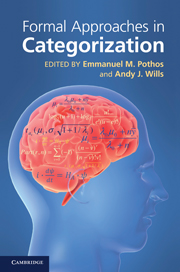Book contents
- Frontmatter
- Contents
- List of figures
- List of tables
- List of contributors
- 1 Introduction
- 2 The generalized context model: an exemplar model of classification
- 3 Prototype models of categorization: basic formulation, predictions, and limitations
- 4 COVIS
- 5 Semantics without categorization
- 6 Models of attentional learning
- 7 An elemental model of associative learning and memory
- 8 Nonparametric Bayesian models of categorization
- 9 The simplicity model of unsupervised categorization
- 10 Adaptive clustering models of categorization
- 11 Cobweb Models of Categorization and Probabilistic Concept Formation
- 12 The knowledge and resonance (KRES) model of category learning
- 13 The contribution (and drawbacks) of models to the study of concepts
- 14 Formal models of categorization: insights from cognitive neuroscience
- 15 Comments on models and categorization theories: the razor's edge
- Index
- References
11 - Cobweb Models of Categorization and Probabilistic Concept Formation
Published online by Cambridge University Press: 05 June 2012
- Frontmatter
- Contents
- List of figures
- List of tables
- List of contributors
- 1 Introduction
- 2 The generalized context model: an exemplar model of classification
- 3 Prototype models of categorization: basic formulation, predictions, and limitations
- 4 COVIS
- 5 Semantics without categorization
- 6 Models of attentional learning
- 7 An elemental model of associative learning and memory
- 8 Nonparametric Bayesian models of categorization
- 9 The simplicity model of unsupervised categorization
- 10 Adaptive clustering models of categorization
- 11 Cobweb Models of Categorization and Probabilistic Concept Formation
- 12 The knowledge and resonance (KRES) model of category learning
- 13 The contribution (and drawbacks) of models to the study of concepts
- 14 Formal models of categorization: insights from cognitive neuroscience
- 15 Comments on models and categorization theories: the razor's edge
- Index
- References
Summary
Description of the model
In this chapter, we describe a family of integrated categorization and category learning models that process and organize past experience to facilitate responses to future experience. The Cobweb system (Fisher, 1987) and its descendants Classit (Gennari, 1990), Oxbow (Iba, 1991), Labyrinth (Thompson & Langley, 1991), Dædalus (Langley & Allen, 1993), and Twilix (Martin & Billman, 1994) comprise a family of models that share a genealogy, a search strategy, and a heuristic to guide that search. We will often refer to this entire family as Cobweb when the intended meaning is clear from the context.
These systems grew out of machine learning and cognitive science research that explored methods for acquiring concepts in an unsupervised context. In that setting, a teacher does not provide explicit category information for instances as the learner encounters them; instead, the learner must decide how to group or categorize a collection of instances. In contrast to most clustering methods, instances are encountered incrementally; the learner must make appropriate adjustments in response to each one as it comes. The Cobweb family of models view categorization as a conceptualization process or as the formation of ontologies. That is, these models provide answers to the question, ‘How does one form conceptual representations of similar experiences and how might those representations be organized?’ However, these models also address the use of the acquired concepts to handle future situations.
Information
- Type
- Chapter
- Information
- Formal Approaches in Categorization , pp. 253 - 273Publisher: Cambridge University PressPrint publication year: 2011
References
Accessibility standard: Unknown
Why this information is here
This section outlines the accessibility features of this content - including support for screen readers, full keyboard navigation and high-contrast display options. This may not be relevant for you.Accessibility Information
- 1
- Cited by
